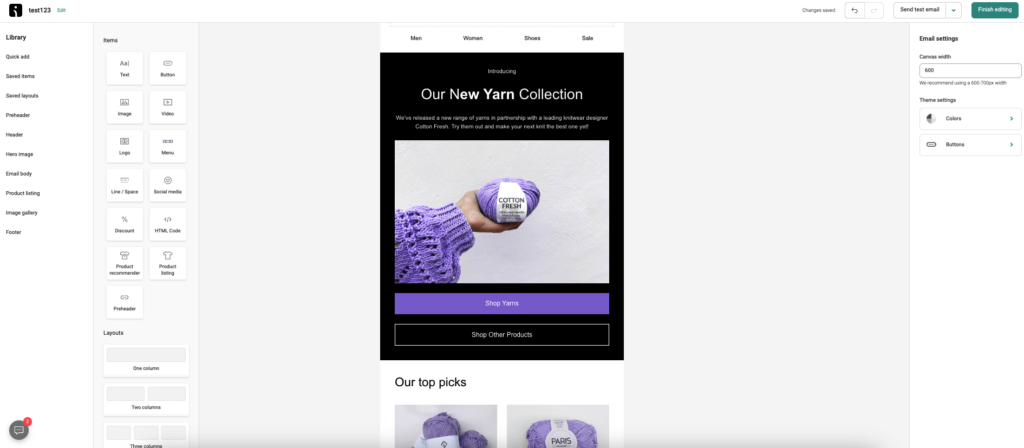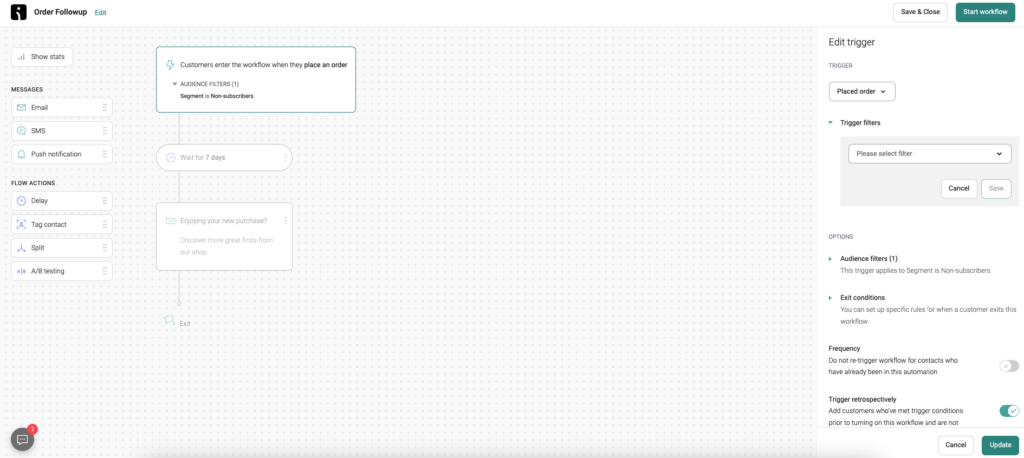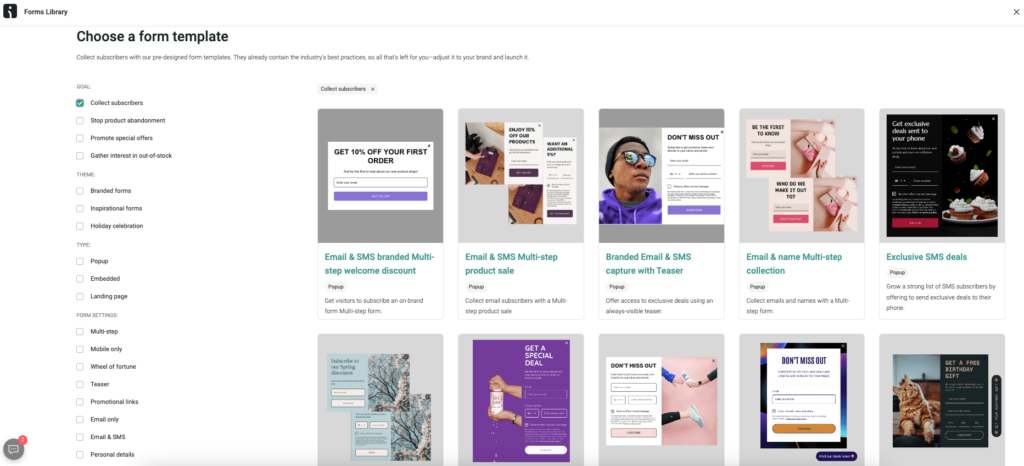CM Commerce is an email marketing and automation platform for ecommerce. Users talk highly of its user-friendly setup, beautiful emails, and brand new intelligent marketing bot, ‘Maggie.’
CM Commerce (former Conversio) has been affiliated with the Campaign Monitor email platform as part of the Marigold group of companies. Due to this connection, both platforms feature a similar logo and name and complement each other in certain functions.
That being said, CM Commerce only cater to some users. For example, well-established ecommerce businesses might seek more fine-tuned and advanced features at a more budget-friendly cost.
Moreover, CM Commerce is missing features, such as landing pages and email templates. That’s why we’ve compiled a list of three CM Commerce alternatives that you should take into account.
By the end of this post, you’ll compare each tool to CM Commerce in terms of features, functions, and pricing and make an informed choice for your business.
Let’s begin.
Quick summary of top 3 alternatives
Let’s briefly review the pros and cons of the three CM Commerce alternatives.
Best overall - Omnisend

Yes
$16
Robust automation
Gamification in signup forms
Unique coupon codes
Modern email templates
Ecommerce businesses of all sizes
Omnisend is one of the best CM Commerce alternatives, boasting prominent email+SMS communication capabilities and an award-winning customer support team.
While both tools cater to ecommerce businesses, Omnisend stands out as a more advanced option. It offers specialized features like a product picker, product recommender, and gamification to meet the unique needs of ecommerce users.
Omnisend pros and cons
- Many attractive signup forms ready to use
- Advanced analytics to monitor ecommerce performance
- Robust automation with a range of pre-built workflows
- Great newsletter template designs
- Geolocation reports are missing
- No call support
Runner-up - Klaviyo

Yes
$20
Powerful segmentation
Advanced reporting capabilities
Modern-looking templates
Ecommerce advanced users
Klaviyo is a noteworthy alternative to CM Commerce because it offers robust ecommerce marketing features on all its paid plans.
The platform stands out with its advanced reporting options, such as personalized benchmarks. Additionally, unlike CM Commerce, Klaviyo offers seamless SMS integration across all its plans.
Klaviyo pros and cons
- Visually appealing email templates
- Pre-designed signup forms and automation workflows
- Exceptional segmentation and list-building tools
- Extensive and detailed analytics and reporting
- Lacks unique coupon code options
- Higher cost compared to CM Commerce and Omnisend
- Steep learning curve
Best cheap alternative - Shopify Email

Yes
$1
Great usability
Affordable price
Simplicity
Email marketing beginners, small Shopify merchants
The final option among the alternatives to CM Commerce is Shopify Email. This tool stands apart from the others covered in this article because it’s tailored exclusively for Shopify store owners.
While it may not be as fancy as other email tools, it’s affordable. You can customize your emails, send tailored messages, automate tasks like cart recovery, and monitor email performance for enhancements.
Shopify Email pros and cons
- It's designed with simplicity in mind
- Clear and intuitive navigation
- A range of visually appealing copy-ready email templates
- Basic automation features are available for free
- Exclusively available to Shopify merchants
- Reporting and analytics features are very basic
- Extra marketing channels and integrations cost more
Best CM Commerce alternatives in a nutshell
In the following table, you can see a quick comparison of CM Commerce’s features against its primary competitors:
Now, let’s delve into each CM Commerce alternative in-depth.
1. Omnisend

Image via Omnisend
Features that stand out
- Email+SMS smooth integration and international reach
- Marketing automation section provides an extensive list of ready-to-use workflows and a robust set of rules and triggers.
- Built-in unique coupon code generator helps you send email campaigns with unique discount codes for each recipient.
- Wheel of Fortune gamifies your list-building and increases engagement.
- Campaign Booster automatically resends campaigns to users who didn’t open your initial emails.
- Product Picker helps you to easily add products to your email campaigns directly from your online store.
Building email campaigns

Unlike CM Commerce, Omnisend’s email builder is intuitive and easy to use. You can create a variety of email campaigns and choose from 250+ modern templates for all occasions.
Omnisend simplifies email personalization by allowing you to centralize your brand assets, such as your logo and brand colors. It automatically adapts your email templates and signup forms to align with your brand’s appearance.
CM Commerce offers notable features, such as the option to incorporate product reviews in emails. It also provides convenient elements for shipping coupons.
However, Omnisend stands out with a broader array of unique features, including:
- Product Recommender
- Unique discount codes
- Product Picker
- Campaign Booster, etc.
Marketing automation

Omnisend shines regarding its powerful automation features. It offers a selection of 25 pre-designed automation workflows for various needs, such as:
- Welcome series
- Anniversary messages
- Cart recovery
- Cross-selling
- Order and shipping confirmations
- Product abandonment
These workflows are ready to use, and you have the flexibility to customize them using the intuitive drag-and-drop automation builder. Additionally, you can enhance your workflows by incorporating SMS and push notifications.
Furthermore, Omnisend can integrate multiple triggers, filters, and conditions. This allows you to address a wide range of scenarios with precision.
As for CM Commerce, there are useful automation features such as copy-ready workflows, triggers, controllers such as delays, various criteria-based splits, and stop actions. Although the functionality is pretty robust, there’s room for improvement in usability.
Forms and list management
While CM Commerce offers a single layout for each signup form, and doesn’t have landing pages, Omnisend offers 80+ unique, ready-to-use forms and landing page templates for your list-building efforts.

Another feature that sets Omnisend apart is its versatile display triggers. These include exit intent, device type, time spent on the page, and scroll depth.
Omnisend maintains its strong performance when it comes to list management. Upon connecting your store, the platform automatically synchronizes contacts. You can further enhance organization by tagging contacts and applying filters for segmentation purposes.
Notably, Omnisend also takes measures to prevent duplicate contacts and extends a list cleaning service.
Compatibility with other marketing channels
Omnisend stands out when it comes to working well with other marketing channels. It can work with:
- SMS
- Web push notifications
- Google ads
- Facebook retargeting
In contrast, CM Commerce only links with Facebook ads. Moreover, this is limited to users on high-tier paid plans.
Price
Omnisend is one of the best CM Commerce alternatives when it’s pricing in question. It offers a free plan, which includes:
- 500 monthly emails, 60 SMS messages, and 500 web push notifications
- Up to 250 contacts
- Advanced features such as automation and unlimited segmentation
- Ready-made popups, signup forms, and a landing page builder
- 24/7 email and live chat support
- Analytics across all channels
Now, let’s dive into the details of Omnisend’s paid plans:
CM Commerce starts cheaper than Omnisend but becomes pricier as your contact list grows. For instance, CM Commerce’s Starter and Growth plans for up to 5,000 contacts are priced at $79 and $149. In contrast, Omnisend offers its Standard and Pro plans at $65 and $90 for the same contact volume.
Additionally, Omnisend provides more features and channels, which enhances its overall value.
Why choose Omnisend instead of CM Commerce?
Omnisend makes its advanced features available on all plans. This makes it a top CM Commerce alternative, especially for ecommerce businesses.
Additionally, you can integrate email marketing automation with SMS across all plans and enjoy round-the-clock support.
Plus, all these benefits pay less than CM Commerce.
Why choose CM Commerce instead of Omnisend?
To be honest, we don’t find any reason for that.
2. Klaviyo

Image via Klaviyo
Features that stand out
- Comprehensive reporting: Klaviyo offers unique features like scheduled custom reports and predictive analytics.
- Product content block: Easily include store items in your emails, similar to what you can do with Omnisend.
- Industry benchmarks: Compare your email marketing performance to your competitors.
- Impressive segmentation: Robust segmentation capabilities with a wide range of conditions and criteria at your disposal.
- Subject line assistant: This feature uses data from your previous email campaigns to help you generate optimized subject lines.
Building email campaigns
Klaviyo offers 90+ customizable email templates that are versatile and suitable for various occasions.

When it comes to personalization, there’s a button to easily include subscriber details like names and locations. While CM Commerce does offer this capability, it’s not as straightforward. On Klaviyo, you can also personalize email product listings based on recent browsing or likes.
One of Klaviyo’s unique features is its subject line assistant. Using this tool, crafting compelling subject lines is extremely easy.
On the whole, Klaviyo’s email builder boasts extensive functionality compared to CM Commerce. While it may be a bit intimidating for beginners, it can be highly advantageous for experienced marketers.
Marketing automation

Klaviyo’s email automation features are pretty advanced. You can use multiple filters, conditional splits, and webhooks. However, this may require some technical expertise.
Like CM Commerce, Klaviyo provides pre-built automation workflows ready to use. These include:
- Abandoned cart messages
- Welcome series
- Browse abandonment notifications
- Cross-sell messages
- Customer thank-you messages
Additionally, Klaviyo offers the advantage of integrating your automation series with SMS on any of its plans. This is something CM Commerce doesn’t offer.
Forms and list management
When it comes to list building and management, both CM Commerce and Klaviyo have their limitations. Still, Klaviyo outperforms CM Commerce, and we’ll explore why.

Klaviyo provides various types of forms, including popups, flyouts, embeds, and full-page forms.
Moreover, on Klaviyo, you can access targeted signup forms to display to specific users. For instance, you can target:
- New visitors
- Audiences from particular lists
- Selected URLs
- Users based on their location
Unfortunately, similar to CM Commerce, Klaviyo doesn’t provide dedicated landing pages. While you can use its full-page forms as makeshift landing pages, achieving this may require some marketing expertise.
On the flip side, Klaviyo’s segmentation tool stands out for its robustness, surpassing many other tools. It provides an extensive range of conditions for creating segments, including:
- User details
- Actions taken or not taken by users
- EU (GDPR) status
- Customer location or proximity
- List-based criteria
- Predictive analytics, and more.
Compatibility with other marketing channels
Klaviyo seamlessly integrates with various marketing channels, including:
- SMS
- App push notifications (distinct from browser notifications)
- Facebook Ads
- Google retargeting
For Facebook and Google Ads functionalities, you can access them by adding app integrations. Clearly, Klaviyo outperforms CM Commerce in this aspect.
Price
Compared to CM Commerce, Klaviyo is pricier because it primarily caters to well-established ecommerce businesses. However, Klaviyo does offer a free plan, which includes:
- Up to 250 contacts
- 500 monthly email sends
- Mobile push notifications
- 150 free monthly SMS/MMS credits
- Email support for the first 60 days
Let’s now delve into the details of Klaviyo’s paid plans.
Although the initial pricing may appear budget-friendly, Klaviyo’s costs increase rapidly as your contact list expands. This is a pattern similar to CM Commerce. Consequently, Klaviyo is better suited for ecommerce businesses with big marketing budgets.
Why choose Klaviyo instead of CM Commerce?
Experienced marketing teams within well-established ecommerce businesses would find Klaviyo more advantageous. This is because they can fully leverage the platform’s advanced automation, segmentation, and reporting features.
Why choose CM Commerce instead of Klaviyo?
Klaviyo is easy to use, but you’ll need time to master its advanced features. In contrast, CM Commerce provides a more beginner-friendly and cost-effective alternative. This makes it a preferable choice for those new to ecommerce marketing.
3. Shopify Email

Image via Shopify Email
Features that stand out
- Unique integration: Shopify Email is integrated into the Shopify ecosystem, making it an add-on without needing a separate signup process.
- Robust segmentation: There’s a wide range of pre-built segments and filters to choose from.
- Affordable pricing: Shopify Email is remarkably affordable, with paid plans starting at just $1 per month.
Building email campaigns

This CM Commerce alternative offers an intuitive email builder ideal for ecommerce businesses. It provides 33 email templates in categories like:
- Announcements
- Holidays and occasions
- Newsletters
- Product highlights
- Promotions
Customization becomes effortless with Shopify Email’s drag-and-drop editor. You also have the option to incorporate brand colors and logos. Moreover, it’s possible to tailor subject lines, preheaders, and content to your liking.
Shopify Email is geared towards ecommerce, featuring product elements, gift cards, and discount codes. However, it lacks features like an image library, carousels, social media embedding, and surveys.
Moreover, just like CM Commerce, Shopify Email is missing A/B testing and RSS campaign support.
Marketing automation

Shopify Email’s automation, like its email builder, is user-friendly. It offers various pre-built workflows, including:
- Shopify abandoned cart emails
- Back-in-stock emails
- Post-purchase upsell emails or SMS
- Customer win-back emails
- Special product releases
We like that all templates within Shopify Email come with suggested copy, allowing you to initiate workflows promptly.
The platform also provides several ecommerce-related triggers. However, we found that locating specific ones was challenging. Additionally, the conditions segment proved less straightforward than CM Commerce alternatives like Omnisend.
On the plus side, there’s an option (not as straightforward as with Omnisend or Klaviyo) to integrate SMS and push notifications into your workflow. This feature is missing in CM Commerce.
Forms and list management
List building falls outside the purview of Shopify Email. To do this, you’ll have to look at other Shopify apps. So, CM Commerce is definitely a more potent tool in this regard.
That said, Shopify Email excels when it comes to segmentation. You can filter audiences based on criteria like:
- Shopping activity
- Location
- Customer details
Segments created within the Shopify platform can be reused in Shopify Email, saving you time.
Additionally, Shopify offers pre-built segments for email subscribers, recent purchasers, abandoned checkouts, and more. These are similar to the ready-to-go audiences offered by CM Commerce.
Compatibility with other marketing channels
Shopify Email doesn’t offer integrations with additional channels. However, you can broaden your marketing reach by exploring third-party apps in the Shopify App Store.
These apps can easily integrate with your Shopify store, enabling you to run coordinated campaigns across various channels.
Price
Shopify Email’s pricing differs significantly from CM Commerce and the alternatives mentioned here.
Businesses using Basic, Shopify, Advanced Shopify, or Shopify Plus plans receive 10,000 free monthly emails. Moreover, abandoned checkout automation is always included at no cost.
Free plan users can also access Shopify’s email templates, but unused email allowances don’t roll over to the next month.
Once you surpass the 10,000 free monthly email limit, you’ll incur fixed charges for every 1,000 additional emails sent. Here’s the breakdown:
- $1 for every 1,000 emails above 10,000
- $0.65 for every 1,000 emails above 300,000
- $0.55 for every 1,000 emails above 750,000
For instance, if you send 15,000 emails, exceeding the 10,000 free limit by 5,000, it will cost $5 USD ($1 per 1,000 emails). Notably, Shopify Email’s pricing isn’t linked to your subscriber list size, setting it apart from other tools.
Why choose Shopify Email instead of CM Commerce?
Without a doubt, if you run a Shopify store, Shopify Email is the superior option. Furthermore, it’s the preferred choice for those with extensive subscriber lists, as its pricing is solely based on the volume of emails sent.
Why choose CM Commerce instead of Shopify Email?
If you seek more advanced features, integrations with other ecommerce platforms, or list-building capabilities, CM Commerce should certainly be your choice over Shopify Email.
CM Commerce alternatives to avoid
At this point, the reasons for including the mentioned platforms in this list of CM Commerce alternatives are clear. On the other hand, when looking for alternatives to CM Commerce, there are certain tools to avoid:
- AWeber: AWeber gets costly as your email list grows, just like CM Commerce. Unfortunately, it doesn’t offer enough features for the price, especially in terms of ecommerce tracking and advanced automation and segmentation.
- ActiveCampaign: ActiveCampaign’s advanced features may be too complex for user-friendly ecommerce needs. Additionally, you’ll need separate bundles for features like split automation, transactional emails, and Facebook Ads, making it a costly CM Commerce alternative.
CM Commerce alternatives: Summary
CM Commerce is a viable email marketing tool, particularly for ecommerce newcomers. However, it does come with limitations, many of which have been discussed in this article.
Hence, exploring CM Commerce alternatives is a logical choice. Among them, Omnisend, Klaviyo, and Shopify Email emerge as three compelling options.
Klaviyo is better suited for well-established ecommerce businesses rather than growing startups. Shopify Email, on the other hand, is ideal for Shopify store owners.
However, when it comes to these CM Commerce alternatives, Omnisend clearly has a significant edge. It offers advanced automation, segmentation, gamification, and email+SMS campaign capabilities. Plus, its 24/7 customer support caters to both free and paid users.
That said, it’s advisable to evaluate each platform’s features, pricing, integrations, and customer support to find the best fit.
In-depth Reviews
Related picks for you
Our team strives to be accurate and unbiased in reviewing email tools. However, we recognize that mistakes can happen, and it’s essential for us to stay up to date. If you come across any errors or things that need to be reviewed again, please let us know.

Leave a Reply